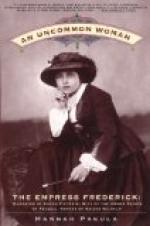Love, then, for the improvisatrice Corilla, was nothing more than a strong wine with which she refreshed and strengthened her fatigued poetic powers for renewed exertions; it was in a manner the tow which she threw upon the expiring fire of her fantasy, to make it flash up in clear and bright flames.
It was only in this way that she loved Carlo, and wept for him, except that in this case her love had been of a longer duration, because it was he who gave up and left her! That was what made her hatred so glowing, that was what made her seek the life of the woman for whom Carlo had deserted her.
“This is a new situation,” said she, “which I am called to live through and to feel. But a poetess must have experienced all feelings, or she could not describe them. For my part, I do not believe in the revelations of genius—I believe only in experiences. One can describe only what one has felt and experienced. Whoever may attempt to describe the flavor of an orange, must first have tasted it!”
That this attempt to murder Natalie had failed, was to her a matter of little moment. She had experienced the emotion of it, and just the same would it have been a matter of indifference to her had the dagger pierced Natalie’s breast—she was sufficiently a child of the South to consider a murder as only a venial sin, for which the priest could grant absolution.
There was only one thing which exclusively occupied Corilla, following and tormenting her day and night, and that was her poetic fame. She desired that her name should stand high in the world, glorified by all Europe, and for this purpose she desired above all things to be crowned as a poetess in the capitol of the holy city; for this fame she would willingly have given many years of her life.
That was the aim of all her efforts, and how much would she not have borne, ventured, and suffered for its attainment! How many intrigues were planned, how much cunning and dissimulation, flattery, and hypocrisy, had been employed for that purpose, and all, all as yet in vain!
Therefore it was that Corilla now wept, and with occasional outbreaks of passionate exclamations violently paced her room. Her cheeks glowed, her eyes flashed—she was very beautiful in this state of excitement. That she must have acknowledged to herself as her glance accidentally encountered her own face in the glass.
With a smile of satisfaction she remained standing before the mirror, and almost angrily she said:
“Ah, why am I now alone, why does no one see me in my beautiful glow? My face might now produce some effect, and gain me friends! Why, then, am I now alone?”
But it seems that Corilla had only to express a wish in order to see it suddenly fulfilled; for the door was at that moment opened, and a servant announced Count Alexis Orloff.
Corilla smiled with delight, and let that smile remain upon her lips, as she very well knew it was becoming to her, and that she had conquered many hearts with it; but secretly her heart throbbed with fear, and timidly she asked herself, “What can that Russian count want of me?”




